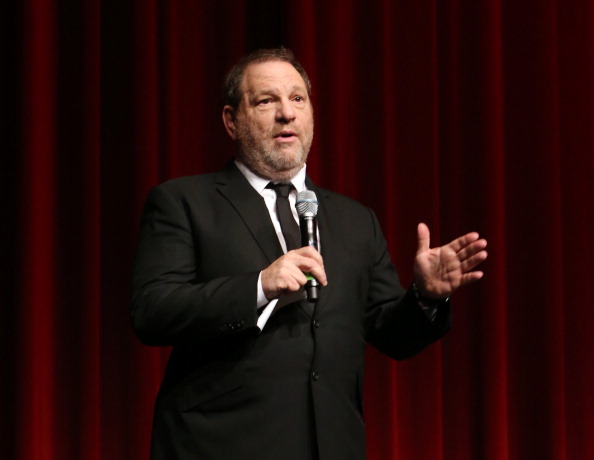Harvey Weinstein sent Hollywood's elite an email begging for support on Sunday, to no avail


A free daily email with the biggest news stories of the day – and the best features from TheWeek.com
You are now subscribed
Your newsletter sign-up was successful
On Thursday, after The New York Times published its exposé on decades of sexual harassment allegations against and payoffs by Hollywood producer Harvey Weinstein, Weinstein called Hollywood talent agents asking any of them to come to his defense, the Times reports. None did. On Sunday, after the board of The Weinstein Company put him on leave and launched an internal investigation into the allegations, Weinstein sent an email to studio executives and agents, saying he was "desperate" for their help. "Do not let me be fired," he wrote, according to a copy of the email dictated to the Times. "If the industry supports me, that is all I need."
At this point, Weinstein wrote he believed he could still "resurrect myself with a second chance," after "therapy and counseling as other people have done." The board, chaired by his brother, Bob Weinstein, fired him Sunday night, effective immediately.
Hollywood and Washington, D.C., have pretty clearly turned against Weinstein, after the Times article made him "a national pariah," Sharon Waxman wrote at The Wrap on Sunday, but the Times was a "media enabler," too. She was referring to an article she wrote for the Times in 2004 about a reputed Weinstein woman-acquirer at Miramax Italy, which included allegations of a payoff to a British woman for an unwanted sexual encounter with Weinstein. The article was "gutted," Waxman wrote, suggesting that intercession from Weinstein, Matt Damon, and Russell Crowe might have been involved.
The Week
Escape your echo chamber. Get the facts behind the news, plus analysis from multiple perspectives.

Sign up for The Week's Free Newsletters
From our morning news briefing to a weekly Good News Newsletter, get the best of The Week delivered directly to your inbox.
From our morning news briefing to a weekly Good News Newsletter, get the best of The Week delivered directly to your inbox.
A free daily email with the biggest news stories of the day – and the best features from TheWeek.com
Peter has worked as a news and culture writer and editor at The Week since the site's launch in 2008. He covers politics, world affairs, religion and cultural currents. His journalism career began as a copy editor at a financial newswire and has included editorial positions at The New York Times Magazine, Facts on File, and Oregon State University.
-
 How Democrats are turning DOJ lemons into partisan lemonade
How Democrats are turning DOJ lemons into partisan lemonadeTODAY’S BIG QUESTION As the Trump administration continues to try — and fail — at indicting its political enemies, Democratic lawmakers have begun seizing the moment for themselves
-
 ICE’s new targets post-Minnesota retreat
ICE’s new targets post-Minnesota retreatIn the Spotlight Several cities are reportedly on ICE’s list for immigration crackdowns
-
 ‘Those rights don’t exist to protect criminals’
‘Those rights don’t exist to protect criminals’Instant Opinion Opinion, comment and editorials of the day
-
 TikTok secures deal to remain in US
TikTok secures deal to remain in USSpeed Read ByteDance will form a US version of the popular video-sharing platform
-
 Unemployment rate ticks up amid fall job losses
Unemployment rate ticks up amid fall job lossesSpeed Read Data released by the Commerce Department indicates ‘one of the weakest American labor markets in years’
-
 US mints final penny after 232-year run
US mints final penny after 232-year runSpeed Read Production of the one-cent coin has ended
-
 Warner Bros. explores sale amid Paramount bids
Warner Bros. explores sale amid Paramount bidsSpeed Read The media giant, home to HBO and DC Studios, has received interest from multiple buying parties
-
 Gold tops $4K per ounce, signaling financial unease
Gold tops $4K per ounce, signaling financial uneaseSpeed Read Investors are worried about President Donald Trump’s trade war
-
 Electronic Arts to go private in record $55B deal
Electronic Arts to go private in record $55B dealspeed read The video game giant is behind ‘The Sims’ and ‘Madden NFL’
-
 New York court tosses Trump's $500M fraud fine
New York court tosses Trump's $500M fraud fineSpeed Read A divided appeals court threw out a hefty penalty against President Trump for fraudulently inflating his wealth
-
 Trump said to seek government stake in Intel
Trump said to seek government stake in IntelSpeed Read The president and Intel CEO Lip-Bu Tan reportedly discussed the proposal at a recent meeting
